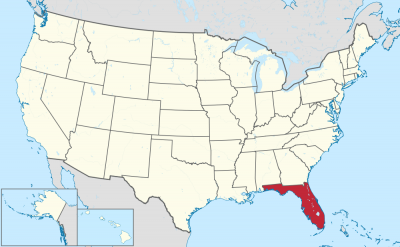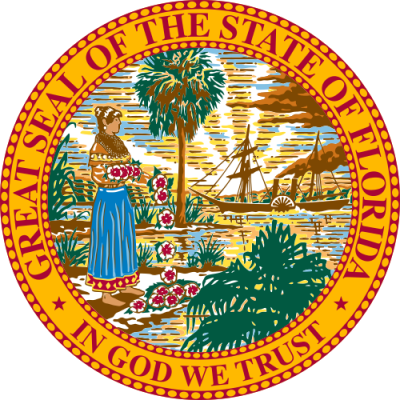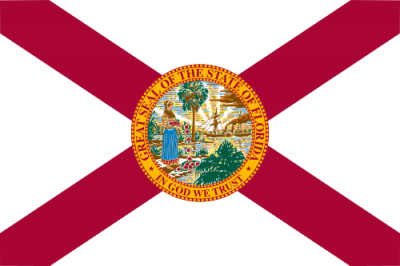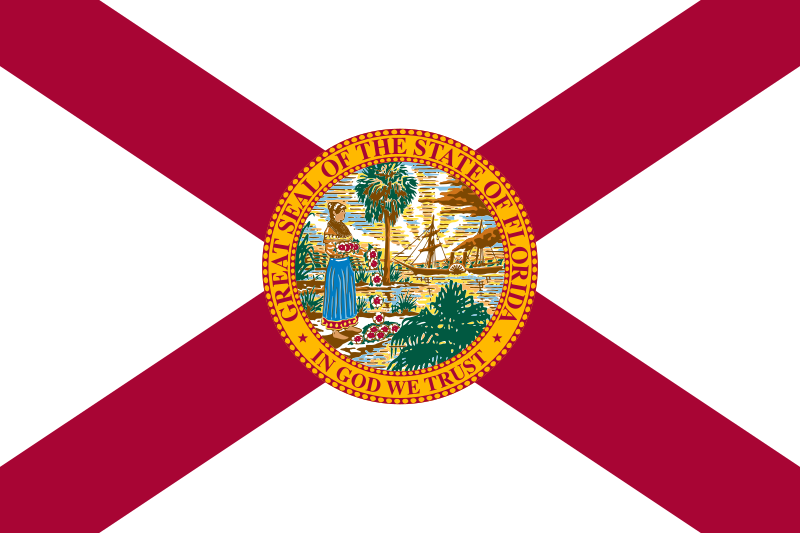


佛罗利达州(英语:State of Florida)是美国本土东南端的一个州,亦属于墨西哥湾沿岸地区,是美国人口第三多的州,为著名的度假、避寒圣地。中文俗称为佛州,佛罗里达。州府位于塔拉哈西,最大的城市为杰克逊维尔,最大的都会区为迈阿密都会区。佛罗利达吸引了不少名人和运动员来这里度假,以高尔夫球、网球、水上活动、赛车著称。
早于欧洲人抵达佛罗里达州前几千年,该地已经有人类居住。利玛窦曾在坤舆万国全图中将之译为“花之屿”。西班牙航海家胡安·庞塞·德莱昂在1513年4月2日,发现这片地方。时值西班牙人称为Pascua Florida(花的复活节)的节日,所以此地被德莱昂命名为La Florida。传说德莱昂是为了找寻青春之泉而发现了佛罗里达。
随后西班牙和法国殖民者逐渐在佛罗里达半岛上建立占据地。其中在1559年建立的彭萨科拉和1565年建立的圣奥古斯丁成为欧洲人在北美洲建立的最早的聚居地。而彭萨科拉和圣奥古斯丁亦分别成为当时西班牙统治下的西佛罗里达和东佛罗里达的首府。而西班牙殖民者在17世纪已成功占领整个佛罗里达半岛和附近地区。
至18世纪,英国在七年战争中占据西班牙的殖民地古巴,西班牙为取回古巴,于1763年将佛罗里达割让予英国作交换条件。西班牙割让佛罗里达予英国后,当地的西班牙移民也一并迁走,而英国也大量在当地殖民。美国独立战争期间,佛罗里达仍效忠于英国,但英国在战败后让美国独立,也于1783年将佛罗里达交回给西班牙,但佛罗里达的英国移民却不愿受西班牙人统治,纷纷起事对抗。西班牙在拿破仑战争后转衰,在1819年西班牙与美国签定条约,将西班牙属佛罗里达割让给美国,以换取美国承认西班牙在得克萨斯的利益。
佛罗里达于1845年3月3日正式成为美利坚合众国第27个州。
1861年,美国南北战争爆发,佛罗里达州于1861年1月10日宣布脱离联邦,随后加入美利坚联盟国,与联邦政府对抗。1865年美利坚联盟国战败,佛罗里达州国会代表团在1868年6月25日重新加入国会,佛州恢复在联邦政府地位。在重建时期后,与其他美国南方州相同,佛罗里达州近一个世纪一直支持民主党,近年逐渐成为共和党的重要根据地。著名的华特迪士尼世界位于本州的奥兰多市内,迪士尼世界是目前六个迪士尼度假区面积最大的。
Florida besteht aus der Halbinsel Florida sowie dem Festlandteil Florida Panhandle und liegt im Südosten der Vereinigten Staaten. An der Ostküste liegt der Atlantische Ozean, an der West- und an der Südküste der Golf von Mexiko.
Der Bundesstaat besitzt am südlichen Ende eine Inselkette, deren Inseln „Keys“ genannt werden. Die bekanntesten sind die Florida Keys, die durch 42 Brücken miteinander verbunden sind. Am Ende dieser Inselkette liegt Key West. Von dort aus sind es nur 140 Kilometer bis nach Kuba. In Key West befindet sich auch der südlichste Punkt der kontinentalen USA.
フロリダ州(英: State of Florida [ˈflɒrɪdə] (![]() 音声ファイル) )は、アメリカ合衆国南東部の州である。メキシコ湾と大西洋に挟まれるフロリダ半島の全域を占め、北はジョージア州とアラバマ州に接しており、サンベルトと呼ばれる比較的気候が温暖な州の1つである。
音声ファイル) )は、アメリカ合衆国南東部の州である。メキシコ湾と大西洋に挟まれるフロリダ半島の全域を占め、北はジョージア州とアラバマ州に接しており、サンベルトと呼ばれる比較的気候が温暖な州の1つである。
フロリダ州の面積は170,306 km2 (65,758 mi2) で、50州の中で22位であるが、海岸線の長さは約1900 kmあり、大陸48州の中では最長である。
フロリダ州は北部と中部が亜熱帯、南部は熱帯に属して概して暖かいので、「サンシャインステート(日光の州)」という渾名がある[1]。2009年の推計人口は18,537,969人となっており、全米50州の中で第4位である[2][3]。州都はタラハシー (Tallahassee) 、人口最大の都市はジャクソンビル (Jacksonville)、その他主な都市としてはマイアミ (Miami)、タンパ (Tampa)、オーランド (Orlando)などがあり、マイアミ都市圏は人口500万人以上を抱える州内最大の都市圏になっている。
ケネディ宇宙センター、スペースポート・フロリダ、ウォルト・ディズニー・ワールド・リゾート、ユニバーサル・オーランド・リゾート、シー・ワールド・オブ・フロリダなどがあることで有名で、アメリカでも有数の観光地として知られている。
Florida (/ˈflɒrɪdə/ (![]() listen),[14] Spanish pronunciation: [floˈɾiða]) is a state located in the southeastern region of the United States. With a population of over 21 million, Florida is the third-most populous and the 22nd-most extensive of the 50 United States. The state is bordered to the west by the Gulf of Mexico, to the northwest by Alabama, to the north by Georgia, to the east by the Atlantic Ocean, and to the south by the Straits of Florida. The state's capital is Tallahassee and its most populous municipality is Jacksonville. The Miami metropolitan area, with a population of almost 6.2 million, is the most populous urban area in Florida and the seventh-most populous in the United States. Other urban areas in the state with a population of more than one million are Tampa Bay, Orlando, and Jacksonville. Florida's $1.0 trillion economy is the fourth-largest of any U.S. state, and if it were a country, Florida would be the 16th-largest economy in the world.[15]
listen),[14] Spanish pronunciation: [floˈɾiða]) is a state located in the southeastern region of the United States. With a population of over 21 million, Florida is the third-most populous and the 22nd-most extensive of the 50 United States. The state is bordered to the west by the Gulf of Mexico, to the northwest by Alabama, to the north by Georgia, to the east by the Atlantic Ocean, and to the south by the Straits of Florida. The state's capital is Tallahassee and its most populous municipality is Jacksonville. The Miami metropolitan area, with a population of almost 6.2 million, is the most populous urban area in Florida and the seventh-most populous in the United States. Other urban areas in the state with a population of more than one million are Tampa Bay, Orlando, and Jacksonville. Florida's $1.0 trillion economy is the fourth-largest of any U.S. state, and if it were a country, Florida would be the 16th-largest economy in the world.[15]
The first European contact was made in 1513 by Spanish explorer Juan Ponce de León, who called it la Florida ([la floˈɾiða] "the land of flowers") upon landing there.[16] At various points in its colonial history, Florida was administered by Spain and Great Britain. Florida was admitted as the 27th state on March 3, 1845. Florida was the principal location of the Seminole Wars (1816 – 1858), the longest and most extensive of Indian Wars in United States history. Florida declared its secession from the Union on January 10, 1861, and was one of the seven original Confederate States. After the Civil War, Florida was restored to the Union on June 25, 1868.
Today, Florida is distinctive for its large Cuban expatriate community and high population growth, as well as for its increasing environmental issues. The state's economy relies mainly on tourism, agriculture, and transportation, which developed in the late 19th century. Florida is also renowned for amusement parks, orange crops, winter vegetables, the Kennedy Space Center, and as a popular destination for retirees. It is the flattest state in the United States,[17] and Lake Okeechobee is its largest freshwater lake.[18]
The state's close proximity to the ocean influences many aspects of Florida culture and daily life. Florida is a reflection of influences and multiple inheritance; African, European, indigenous, Latino, and Asian heritages can be found in the architecture and cuisine. Florida has attracted many writers such as Marjorie Kinnan Rawlings, Ernest Hemingway and Tennessee Williams, and continues to attract celebrities and athletes. It is internationally known for golf, tennis, auto racing, and water sports. Several beaches in Florida have turquoise and emerald-colored coastal waters.[19]
About two-thirds of Florida occupies a peninsula between the Gulf of Mexico and the Atlantic Ocean. Florida has the longest coastline in the contiguous United States, approximately 1,350 miles (2,170 km), not including the contribution of the many barrier islands.[20] Florida has a total of 4,510 islands that are ten acres (4 ha) or larger in area.[21][22] This is the second-highest number of islands of any state; only Alaska has more.[21] It is the only state that borders both the Gulf of Mexico and the Atlantic Ocean. Much of the state is at or near sea level, and is characterized by sedimentary soil. Florida has the lowest high point of any U.S. state. The American alligator, American crocodile, American flamingo, Roseate spoonbill, Florida panther, bottlenose dolphin, and manatee can be found in Everglades National Park in the southern part of the state. The climate varies from subtropical in the north to tropical in the south.[23] Along with Hawaii, Florida is one of only two states that have a tropical climate, and is the only continental state that has both a tropical climate and a coral reef. The Florida Reef[24] is the only living coral barrier reef in the continental United States,[25] and the third-largest coral barrier reef system in the world (after the Great Barrier Reef and Belize Barrier Reef).[26]
La Floride (en anglais : Florida /ˈflɔɹ.ɪ.də/ ; en espagnol : Florida /floˈɾi.ða/) est un État américain situé dans le sud-est des États-Unis, sur la côte dite du Golfe. Elle est bordée à l’ouest par le golfe du Mexique, au nord par l'Alabama et la Géorgie et à l’est par l’océan Atlantique. Avec plus de 21 millions d'habitants en 2019, il s'agit du troisième État le plus peuplé du pays (après la Californie et le Texas). Avec une superficie de 170 451 km2, la Floride se classe au 22e rang des États américains. Sa capitale politique est Tallahassee, mais l'agglomération la plus peuplée est Miami, qui compte plus de 6,1 millions d'habitants (estimations de 2017).
La Floride est constituée à l'est d'une péninsule d'environ 630 km de long et à l'ouest d'une bande côtière étroite d'environ 330 km de long en forme de « queue de poêle » (panhandle). Sa géographie est marquée par un littoral étendu, par l'omniprésence de l'eau et par la menace des ouragans. Le relief se caractérise par de faibles altitudes — le point culminant atteignant seulement 105 m d'altitude — et des terrains sédimentaires, le climat variant de subtropical au nord, à tropical au sud. Ses animaux emblématiques, comme le lamantin et l'alligator, peuvent être aperçus dans les Everglades, l'un des parcs nationaux les plus connus au monde.
Depuis sa découverte, en 1513, par l'Espagnol Juan Ponce de León qui la baptise « la Pascua florida » (« les Pâques fleuries » en référence au dimanche des Rameaux), la Floride est un enjeu pour les puissances coloniales européennes avant d'intégrer les États-Unis en 1845. Elle est le théâtre des guerres séminoles, contre les Amérindiens, puis de la ségrégation raciale, après la guerre de Sécession ; elle se distingue par son importante communauté cubaine et une forte croissance démographique soulevant des problèmes environnementaux. Son économie repose principalement sur le tourisme, l'agriculture et les transports, qui se développèrent à la fin du XIXe siècle. Elle est connue pour ses parcs d'attractions, la production d'oranges et le Centre spatial Kennedy.
La culture floridienne est le reflet d'influences et d'héritages multiples, amérindiens, afro-américains, anglo-saxons et hispaniques, héritages que l'on retrouve dans l'architecture et la gastronomie. La Floride attire de nombreux écrivains comme Marjorie Kinnan Rawlings, Ernest Hemingway, ou encore Tennessee Williams et continue de séduire les vedettes et les sportifs. Elle est internationalement réputée pour le tennis, le golf, les courses automobiles et les sports liés à la mer.
La Florida (/ˈflɔːrida/ o /floˈriːda/, in inglese: /ˈflɒɹɪdə/ o 'flɔː-, in spagnolo: /floˈɾiða/)[2] è uno stato degli Stati Uniti d'America. Si estende su buona parte dell'omonima penisola ed è bagnata ad ovest dal Golfo del Messico, mentre a nord confina con gli Stati della Georgia e dell'Alabama e ad est si affaccia sull'Oceano Atlantico. È il 22º stato per superficie degli Stati Uniti e il 4° per popolazione. La sua capitale è Tallahassee ma la città più conosciuta è Miami. La sua geografia è segnata da un'estesa linea costiera, dall'onnipresenza delle acque e della minaccia degli uragani. Il terreno è caratterizzato dalla bassa elevazione, costituito prevalentemente da rocce sedimentarie. Il clima varia dal subtropicale a nord, al tropicale a sud. Animali caratteristici sono il lamantino e l'alligatore.
Fin dalla sua scoperta nel 1513 ad opera dello spagnolo Juan Ponce de León, la Florida è stata una sfida coloniale per le potenze europee, prima di essere integrata dagli Stati Uniti nel 1845. Fu teatro di guerre contro gli indiani Seminole, e della segregazione razziale dopo la guerra civile. Oggi si distingue per la sua grande comunità cubana e la forte crescita della popolazione solleva questioni ambientali. La sua economia, che si è andata sviluppando dal tardo XIX secolo, si basa principalmente sul turismo, sull'agricoltura e sui trasporti. È anche nota per i suoi parchi di divertimento, per la produzione di arance e per il Kennedy Space Center
La cultura della Florida riflette diverse influenze, quella anglosassone, indios, afro-americana e ispanica che si trova riflessa nell'architettura e nella gastronomia. La Florida ha attirato molti scrittori, come Marjorie Kinnan Rawlings, Ernest Hemingway, e Tennessee Williams. Il soprannome della Florida è Sunshine State (usato anche nelle targhe delle auto) e gli animali simbolo sono la pantera della Florida, che però è sempre più rara nel territorio della Florida, e l'alligatore, invece molto presente.
Florida o la Florida (esta última denominación empleada sobre todo por hispanohablantes de EE. UU., así como cubanos y dominicanos)3 es uno de los cincuenta estados que, junto con Washington D. C., forman los Estados Unidos de América, ubicado en la región meridional del país. Limita al occidente con el golfo de México y Alabama, al norte con Alabama y Georgia, al oriente con el océano Atlántico y al sur con el estrecho de Florida. Florida ocupa el puesto 22 en cuanto a extensión y el tercero en cuanto a población.4
Jacksonville es la ciudad más poblada del estado y la ciudad más extensa por superficie en el territorio continental de los Estados Unidos (debido a la consolidación de Jacksonville con el condado de Duval). El Área Metropolitana de Miami es el área más urbanizada del estado. Tallahassee es la capital del estado.
Cerca de dos tercios del estado conforman una península entre el golfo de México y el océano Atlántico. Florida tiene la costa más extensa del territorio continental de Estados Unidos, aproximadamente 1350 millas, sin incluir la contribución de las Islas Barrera. Es el único estado que limita tanto con el golfo de México como con el océano Atlántico. Gran parte del estado se encuentra al nivel del mar o cerca de él y se caracteriza por el suelo sedimentario. El clima varía de subtropical en el norte a tropical en el sur.5
El cocodrilo americano, la pantera de Florida y el manatí se pueden encontrar en parque nacional de los Everglades en la parte sur del estado. Florida, por el gran territorio costero, es el único estado continental de los Estados Unidos con clima tropical (el otro estado con este tipo de clima es Hawái).
Desde la llegada de exploradores españoles al mando de Juan Ponce de León, quién la nombró La Florida, en 1513; el territorio fue un reto para el colonialismo europeo antes de convertirse en un estado de la Unión en 1845. Fue el principal teatro de las Guerras Seminolas y se caracterizó por la existencia de segregación racial después de la Guerra de Secesión.
En el sigo XXI, Florida se distingue por su gran comunidad de expatriados cubanos y su alto crecimiento poblacional, así como por sus crecientes problemas ambientales. La economía del estado se basa principalmente en el turismo, la agricultura y el transporte, que se desarrolló a fines del siglo XIX. Florida también es reconocida por sus parques de atracciones (como Walt Disney World, Bush Gardens y Universal Studios Florida), sus cultivos de cítricos, sus verduras de invierno, el Centro Espacial Kennedy, y como un destino turístico popular entre los jubilados estadounidenses.
La cultura de Florida es un reflejo de múltiples influencias; la herencia africana, europea, indígena e hispanoamericana se puede encontrar en la arquitectura y la cocina. Florida ha atraído a muchos escritores como Marjorie Kinnan Rawlings, Ernest Hemingway y Tennessee Williams. Es internacionalmente conocida por la práctica de deportes como el golf, el tenis, el automovilismo y los deportes acuáticos.
Флори́да[1][2][3] (англ. Florida , МФА [ˈflɒrɪdə], от исп. florida «цветущая») — штат[4] на юго-востоке США; столица — город Таллахасси.
Расположен на одноимённом полуострове между Мексиканским заливом на западе и Атлантическим океаном на востоке, с юга омывается Флоридским проливом. На севере граничит со штатами Алабама и Джорджия. Морские границы проходят вдоль всего полуострова, захватывая немного территории к северу от него и группу островов Флорида-Кис к югу.
Население — 20 271 272 чел. (2015 год): 3-й по численности населения штат США (после Калифорнии и Техаса)[5].
Площадь территории — 170 304 км²: 22-й по площади территории штат США. Крупнейший город — Джэксонвилл, крупные города — Майами, Тампа, Орландо.




 Geography
Geography



